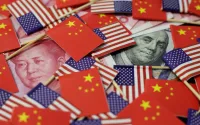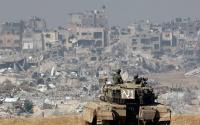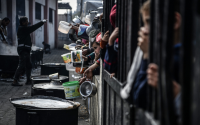13 September 2005Terry Kirby
British and American arms companies have been criticised for marketing weapons used in Iraq at Europe's biggest arms fair.
Campaigners against the arms trade have criticised the Government for inviting countries with dubious human rights records, such as Indonesia and Colombia, to the fair. The campaigners also accused companies such as Lockheed and BAE Systems of "revelling" in the opportunity to sell equipment "battle-tested" in Iraq to those countries.
A massive police presence is expected at the Defence Systems and Equipment International (DSEi) exhibition at the Excel Centre in London's Docklands when it officially opens this morning to invited guests only. There were angry confrontations between police and demonstrators at the last arms fair two years ago, and similar protests are expected this time. The bill for policing is likely to cost the taxpayer millions of pounds.
The exhibition has been criticised by the Metropolitan Police for diverting resources during a period of heightened terror alert. Ken Livingstone, the Mayor of London, has also criticised the fair.
Among the 1,200 exhibitors from 34 countries are many which have made equipment used in Iraq. At the stand of Lockheed Martin, there are replicas of the Hellfire and Thaad (Theatre High Altitude Area Defence) missiles, both of which have been deployed in Iraq. Although the Hellfire is mainly as an air-launched missile, the version being promoted at DSEi is a new type for ground or sea launch. "It has been used regularly and very successfully in Iraq and this one is exactly the same," said Doug Terrell, a Lockheed Martin executive on the stand. "The US Army, Marine Corps and Special Forces absolutely love it." Almost 20,000 Hellfires have been sold worldwide.
The exhibition is run in conjunction with the Defence Export Services Organisation (Deso), the arm of the Ministry of Defence that promotes the sale and licensing of British-made military equipment. Yesterday's press preview day included a catwalk-style show organised by Deso, with soldiers in full battledress posing with weapons. These included the British L96 sniper rifle used in Iraq as well as chemical detection equipment, airfield illumination systems and light anti-armour weapons.
A spokesman for the Campaign Against the Arms Trade said: "The arms fair will include nearly all the main providers of the weapons used in the invasion and occupation of Iraq. They will not be embarrassed about a conflict undertaken on a false premise that has cost tens of thousands of civilian lives, but will be revelling in the use of their weapons in the conflict and the promotional material that it provides."
The spokesman said the invasion and occupation of Iraq had been "good news" for the major arms companies. "It has allowed them to label their arms as battle-tested and provided them with promotional material for their missiles, bombs, fighter aircraft, artillery, tanks and armoured vehicles. They will be marketing their weapons to countries from around the world with the full support of the UK Government and the perverse promotional assistance provided by the ongoing conflict in Iraq."
The campaigners, who are backed by the Liberal Democrats, say it is wrong that the exhibition should be a venue for countries which have been criticised by the Foreign Office for their record on human rights to purchase arms.
Deso said invitations were issued after consultation with other departments such as the Foreign Office and the intelligence services. It also pointed out that an invitation did not mean that a licence to export would automatically follow.
The exhibition organisers say the event is "not an arms fair". A spokesman said: "You can't just walk in off the street and buy weapons." He stressed that only a small proportion of exhibitors sold actual weapons and that the majority were concerned with such areas as disaster relief, peacekeeping and humanitarian activities and homeland security.
What to buy this week
* L96 sniper rifle. Made by Accuracy International and used by British troops, often as cover for bomb disposal experts.
* Hellfire Missile. Made by US-based Lockheed Martin. Normally fitted to Apache helicopters.
* The Nlaw (Next Generation Light Anti-Tank Weapon) is a disposable, one man, portable high explosive system made in Britain by the French company Thales.
* THAAD (Theatre High Altitude Area Defence). Designed, says Lockheed, to destroy attacking missiles.
The countries
* CHINA
Invited despite an EU embargo on arms sales and Tony Blair's statement in Beijing this month that there was a "question mark" over human rights.
* INDONESIA
Dubious human rights record over the conflicts in Sumatra and Irian Jaya has kept Indonesia on the uninvited list since 1999. Campaigners have documented "extrajudicial executions, arbitrary detention, torture, sexual violence and destruction of property" by the military in 2004-05.
* COLOMBIA
The Foreign Office said "members of the security forces collude with paramilitaries and are involved in drug trafficking".
* SAUDI ARABIA
Third-largest recipient of UK arms exports, where Amnesty International last year reported an escalation of "killings by security forcesexacerbating the already dire human rights situation in the country". Foreign Office said the state "continued to violate human rights".
* ALGERIA
The Foreign Office says there are "numerous documented allegations of human rights abuses by the security forces and state-armed militias".
http://news.independent.co.uk/uk/this_britain/article312204.ece






